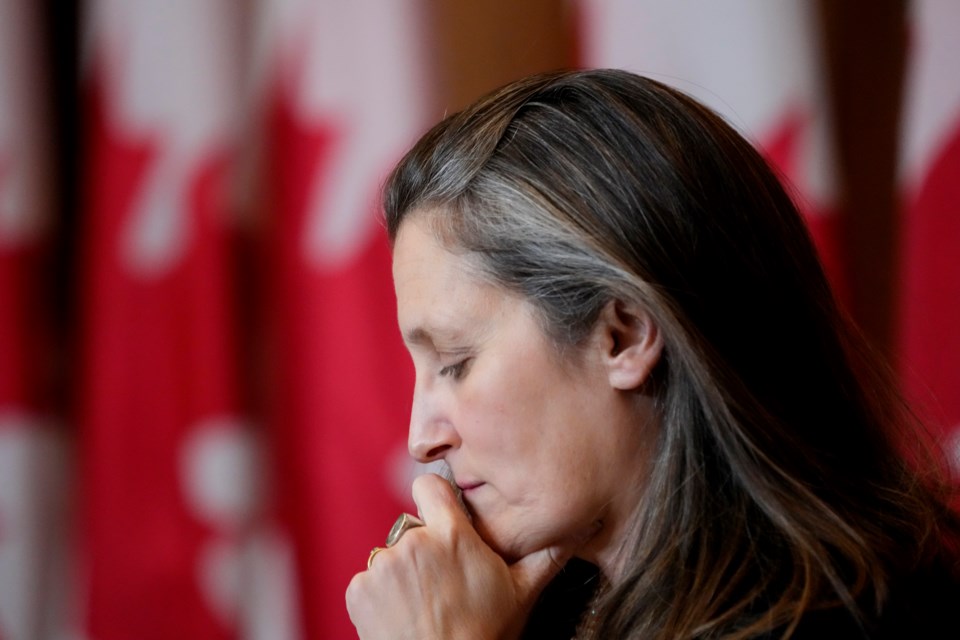OTTAWA — The federal government is digging into the finances of Russian oligarchs in Canada, Finance Minister Chrystia Freeland said Tuesday, with an eye to imposing more sanctions to choke off President Vladimir Putin's war on Ukraine.
And Freeland had a warning for Canadians — future sanctions against Russian business interests in Canada could cause some economic "collateral damage" domestically. But she said the cost will be worth it if sanctions succeed in stopping Putin from successfully invading Ukraine, which would upend the post-Second World War international order.
"We are looking carefully at the holdings of all Russian oligarchs and Russian companies inside Canada. We're reviewing them and everything is on the table," Freeland said, making clear that more sanctions against Russia by Canada and its G7 partners would go even further in the coming days.
"We have to be honest with ourselves, I have to be honest with Canadians, that there could be some collateral damage in Canada," she added.
Freeland said any future pain would be far worse for European countries, which are heavily dependent on Russian oil and gas and have deeper economic ties with Russia than Canada. Freeland did not single out any specific Russian business interests.
Canada's co-ordinated moves with its Western allies against Russia on the economic front were bolstered earlier Tuesday by new moves in the global legal arena.
Foreign Affairs Minister Mélanie Joly announced Canada's intent to petition the International Criminal Court to speed up its investigation into Russia for possible war crimes as images spread of Russian bombardment of civilian targets in Kyiv and Ukraine's second-largest city, Kharkiv.
On Monday, ICC prosecutor Karim A.A. Khan said he planned to open an investigation into possible war crimes in Russia, but because Ukraine is not a party to the Rome Statute that governs the court it "cannot itself refer the situation" to his office.
Khan said he needed a signatory to the Rome treaty, so Joly announced Tuesday Canada was stepping up to do that — after she joined a mass walkout of more than 100 diplomats of an address by their Russian counterpart, Sergey Lavrov, at the United Nations Human Rights Council in Geneva.
"Today, also Canada will petition the International Criminal Court of justice against Russia, for crimes against humanity and war crimes. And it was also important for us to show that we're steadfast in terms of our support," Joly said Tuesday in Geneva.
Canada is a state party and founding member of the ICC and the Rome Statute after hosting talks that led to the court's creation a quarter-century ago.
Joly said she and her fellow officials walked out on Lavrov to send a message to Russia over the invasion.
"Minister Lavrov was being broadcast and giving his version, which is false, about what is happening in Ukraine," said Joly.
Lavrov, along with Putin, have been sanctioned by Canada and their allies for their role in orchestrating what is described as an illegal attack on a sovereign country.
But Freeland made clear that more sanctions were coming after she spoke with G7 finance ministers earlier Tuesday.
They were joined by Ukraine's "tired but determined" finance minister, who assured them his country would win the war as he spoke from a windowless room with a "spartan cot behind him and a blue and yellow flag taped to the wall."
She said the existing sanctions are the most serious and stringent ever imposed on a major economy and new measures will keep targeting the institutions and individuals enabling Putin to advance his attack.
"We understand the stakes of this great conflict between democracy and dictatorship. The battleground today is Ukraine. But this is our fight too. President Putin has made a grave and historic error," she said. "This is the last gasp of a failing kleptocracy. And President Putin has now become an international pariah."
Environment group Stand.earth called on Canadian banks to pull their investments with Russian oil and gas companies. The organization said at least US$110 million is invested in some of Russia's biggest oil and gas firms, and while small, Canadian companies need to do as much as possible to support Ukraine and cut off Russia's was chest.
Canada announced new action with its G7 allies on Tuesday, saying it would ban Russian-owned or registered ships and fishing vessels in Canadian ports and internal waters. The ban takes effect later this week under the Special Economic Measures Act.
Defence Minister Anita Anand also said Canada would increase its military aid to Ukraine by providing another 1,600 fragmentation vests and almost 400,000 meal packs.
Joly was leaving Geneva and headed to Poland later Tuesday for meetings with her counterparts there to address the Ukrainian refugee exodus and oversee the delivery of Canadian military aid.
The United Nations estimates 660,000 people have now fled Ukraine while many others have been displaced from their homes within the country.
International Development Minister Harjit Sajjan also announced Tuesday an extra $100 million in humanitarian assistance for Ukraine. The new money was being targeted at helping displaced people and providing emergency health services, including trauma care, shelter, water, sanitation and food.
Sajjan said the lives of Ukrainian children have been thrown into chaos.
"Classrooms have been replaced by bomb shelters. Playgrounds have become battlefields. Beds have become the hard ground. It is why, as Canadians, we have and will continue to step up to show that we will stand on the right side of history," Sajjan said.
Sports Minister Pascale St-Onge said on Twitter that the government "fully supports the Canadian Olympic and Paralympic Committees' calls for a ban of Russian and Belarusian athletes from the 2022 Paralympic Winter Games" because of the "horrific attacks" on Ukraine.
Canada has already closed its airspace to Russian commercial planes, and it will ban all Russian oil imports, which were already nearly non-existent.
This report by The Canadian Press was first published March 1, 2022.



